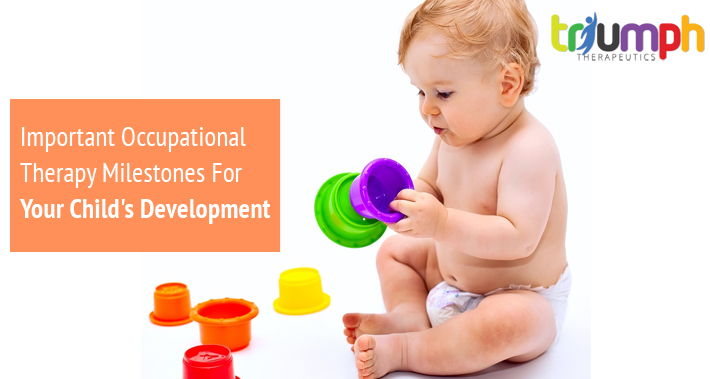Important Occupational Therapy Milestones For Your Child’s Development
https://www.triumphtherapeutics.com/wp-content/uploads/2022/08/Triumph-Therapeutics-Speech-Therapy-OT-Physcial-Therapist-Washington-DC-Aug03-01-2022.jpg 710 379 Triumph Therapeutics Triumph Therapeutics https://www.triumphtherapeutics.com/wp-content/uploads/2022/08/Triumph-Therapeutics-Speech-Therapy-OT-Physcial-Therapist-Washington-DC-Aug03-01-2022.jpgOccupational therapy milestones are important markers for the growth and development of your child.
Keeping track of them allows you to keep an eye on their development and progress.
This way, you’ll know if your child needs some extra help.
If they do, there are some great options if you’re looking for pediatric occupational therapy services near me in the Washington DC area – may we humbly recommend ourselves, Triumph Therapeutics?
If your child is falling significantly behind and not showing any progress, it’s possible that they might have an underlying condition or a developmental delay.
Pediatric occupational therapists are a great resource that can specialize in developmental delays therapy for kids.
This is the third article in a three part series on developmental milestones.
First, we explored pediatric physical therapy milestones – the milestones largely related to gross motor skills, and how to know when it’s a good idea to seek out a kids’ physical therapist to help.
Next, we took a look at pediatric speech therapy developmental milestones – same as above, only related to pediatric speech therapy, naturally.
This time, we’re going to explore pediatric occupational therapy milestones – largely, but not entirely, related to the domain of fine motor skills.
Let’s take a look.
What Is An Occupational Therapy Milestone?
There are four main categories of occupational therapy milestones.
These are: fine motor skills, gross motor skills, visual motor skills, and self care.
Fine motor skills involve the small muscles in your hands that you use to hold and manipulate items.
Gross motor skills include the large muscles of your body and are integral to how you navigate your environment in a coordinated way.
The use of your eyes and hands efficiently together is considered to be your visual motor skills.
Finally, self care refers to how you care for yourself and complete your necessary daily tasks like feeding, grooming, toileting, and dressing.
Together, each of these categories make up occupational therapy milestones that are general markers of development.
What Pediatric Occupational Therapy Milestones Should My Child Be Reaching?
Every child is different and reaches their occupational therapy milestones at different times.
However, there is an average rate for mastering occupational skills and this average rate is the basis for the timing of these milestones.
Let’s discover more about what each milestone looks like, and what to be on the lookout for if your child is not reaching them.
Age Three Months
By three months of age, your baby should be able to:
- Involuntarily grasp objects with all of their fingers
- Lift their head momentarily during tummy time
- Turn side to side
- Bear weight on their forearms.
If they don’t meet these milestones, it could lead to poor muscle development.
Age Four Months
By age four months, your baby should be able to hold their head in line with the middle of their body in all play positions.
There should also be no head lag when they are pulled from lying to sitting by an adult, and they should be able to roll from their back to their side.
Once they’ve learned to roll, your baby – and, by extension, you – will likely enjoy a more restful sleep.
Age Six Months
Once your baby reaches six months of age, they should be able to:
- Play with toys while sitting and transfer them between their hands
- Use a radial digital grasp on blocks
- Bring their feet to their mouth and their hands to their feet
- Bear weight on their forearm and reach forward on their belly
- Crawl forward on their belly
- Sit independently for several minutes
- Bang a spoon
- Drink from an open cup with assistance
- Hold their own bottle during feeding
If they’re not reaching these milestones, it could lead to a delayed ability to play independently, and delayed sensory development due to less interaction with their toys and other sensory objects.
Age Nine Months
At nine months of age, your baby should be able to:
- Imitate scribbling
- Pick up small objects using a weak pincer grasp
- Follow objects with their eyes
- Confidently crawl on their hands and knees
- Begin to drink from a straw
- Use furniture to pull themselves up to a supported standing position.
If they’re far behind reaching these goals, then it could lead to poor muscle development.
Age One Year
By the time your baby turns one, they should be able to:
- Point with their index finger
- Scribble on paper
- Climb up the stairs on their hands and knees
- Fling a ball
- Walk independently
- Use a spoon correctly, if not neatly
- Tolerate bathing, diaper changes, and grooming activities
If they’re not reaching these occupational milestones, it could lead to a delay of their independent play skills and their self care skills
Age Eighteen Months
By eighteen months of age, your baby should be able to:
- Use two hands during play
- Run (though likely not terribly gracefully)
- Turn the pages of a cardboard book
- Kick a ball forward
- Put on socks
If they’re not here yet, it could lead to a delay in their manipulation skills and to the poor development of their hand and finger strength.
Age Two Years
When your baby turns two years old, they should be able to:
- Complete a three piece insert puzzle
- Hold and snip with child safe scissors
- Jump down from a step
- Kick a ball with improved accuracy
- Catch a large ball against their chest
- Begin to use a fork after mastering the spoon
- Show an interest in toileting
If you notice that these milestones aren’t being reached, it’s a good idea to monitor your child because it could lead to delayed self care skills and delayed prewriting skills development.
Age Thirty Months
When your child hits thirty months of age, they should be able to:
- String beads
- Cut a six inch piece of paper
- Use a fork well
- Pull down pants with an elastic waistband
- Wash their hands independently
- Indicate when they have to go to the bathroom
- Unbutton large buttons
If they’re not able to do these things, it could lead to a delay of their ability to manipulate small objects, which could also lead to a frustration around tasks that require this skill.
Age Three Years
By three years of age, your child should be able to:
- Cut a straight line with safety scissors
- Copy a vertical or horizontal line
- Jump with two feet off the floor
- Climb
- Run
- Put on their shoes with little assistance
- Go to the bathroom independently, although they might still need help cleaning up afterwards
If they’re not hitting these milestones, it could lead to poor self care skills like eating or toileting, and delayed drawing or writing skills.
Age Three And A Half Years
When your child is three and a half years old, they should be able to:
- Cut out a complete circle with safety scissors
- Grasp a writing utensil with three points of contact
- Stand on one leg for five seconds
- Accurately throw a ball
- Find the front of their clothing items
- Zip and unzip zippers
- Push buttons
- Unbuckle a velcro shoe
If your child falls behind with these milestones, it can lead to poor pencil grasp, poor pencil control, and a growing frustration or avoidance of pencil based tasks.
Age Four Years
By the time your child turns four, they should be able to:
- Colour within the lines
- Jump forward
- Catch a ball without using their chest
- Remove a pullover garment
- Brush their teeth with supervision
- Toilet completely independently including washing hands and clothing management
Depending on the milestones they are not meeting, being behind at this point can lead to a dependance on caregivers for everyday self care activities like dressing or eating.
Age Four And A Half Years
By four and a half years, your child should be able to:
- Easily use a dynamic grasp on a writing utensil
- Weave a belt through their belt loops.
Being able to use a writing utensil by this age is important because if they’re not able to, it could lead to difficulties with developing their handwriting skills and learning the letters of the alphabet.
This can have a larger impact on their language and reading skills, so it’s important to monitor your child if you notice they’re not meeting this milestone.
Age Five Years
When your child is five, they should be able to:
- Draw a stick figure
- Complete a 20 piece puzzle
- Print name and most letters of the alphabet
- Stand on each foot for 10 seconds
- Skip proficiently
- Tie a knot
- Bathe with assistance to set up water, and wash their hair
If they’re not meeting these milestones, it could lead to difficulties forming letters, which could lead to difficulties demonstrating academic ability on paper.
Age Six Years
By the time your child is six years old, they should be able to:
- Cut a variety of shapes
- Run with speed and endurance for long distances
- Throw and catch a ball well over long distances
- Use a knife well
- Tie their shoes and bows
- Develop more precise and legible handwriting
If they’re behind these milestones, it could impact their academic ability because they are unable to keep up in class due to their slow and illegible handwriting.
This could lead to frustration, difficult behaviors, and even impact their self esteem when they see their peers developing at different speeds.
It’s important to note a well that this can be a sign of an underlying language disorder, like dyslexia.
`
What If My Child Isn’t Meeting These Milestones?
A couple of weeks late is no big deal, especially if your child is continuing to make progress.
But, if you see that they’re falling significantly behind and not showing any concrete development, it could be a sign of an underlying condition.
In that case, it’s a good idea to book an appointment with Triumph Therapeutics for an evaluation.
Book Your Appointment With Triumph Therapeutics Today
If you’re concerned that your child is falling significantly behind their occupational therapy milestones, you should take them to a pediatric occupational therapist for an evaluation.
Your therapist will check for any underlying conditions and develop a treatment plan to get your child back on track.
To get started, book an appointment with Triumph Therapeutics today.


